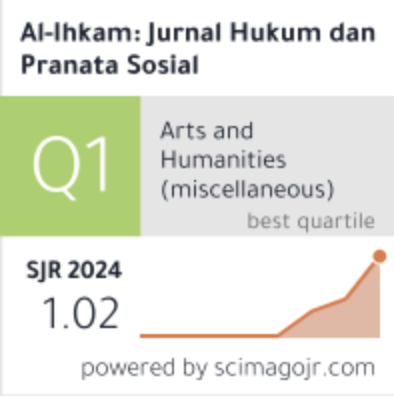The Implementation of Islamic Value Absorption in Regional Regulations in Madura Regency
 Abstract views: 584
,
Abstract views: 584
,
 PDF downloads: 456
PDF downloads: 456
Abstract
In Madura, a number of Sharia and / or sharia nuances Regional Regulations were born. Whereas, Indonesia is not a religious state. The emergence of such Regional Regulations is believed to cause a lot of conflict in the society. Therefore, it is necessary to know How is the legal politics of values absorption or Sharia legal provisions in the Regional Regulations of Madura Regency? This research is a normative legal research. This research includes a conceptual approach, a statutory approach, and a case approach. The finding shows that the application and / or absorption of Sharia in Madura are due to the religious values that attached in the societies' daily life. So after conducting the research, it is found that the application and / or absorption of the Islamic values in regional legal products in Madura are divided into two types; firstly; direct absorption and / or application of regional legal products, in the form of Perda or Perbup. Secondly, the absorption and / or application of Islamic legal values to regional legal products do not directly manifest the sharia legal products, but substantially, the material contained in the legal products has absorbed the Islamic values into it.
Downloads
References
Abdul A’la., et al, “Islamism in Madura; From Religious Symbolism to Authoritarianism”, Journal Of Indonesian Islam, Volume 12 Number 02, (December 2018).
Agung Ali Fahmi, Implementasi Jaminan Hukum HAM Atas Kebebasan Beragama Di Indonesia. Yogyakarta : Interpena. 2011.
Agung Ali Fahmi, Uswatun Hassanah and Yahya Suryawinata. “Resolusi Penolakan Daerah Terhadap Badan Pengelolaan Suramadu Pasca Jembatan Surabaya-Madura Dalam Perspektif NKRI”. Seminar Nasional Industrialisasi Madura. Fakultas Teknik Universitas Trunojoyo Madura. 2015
Agung Ali Fahmi, Implementasi Kebebasan Beragama Menurut UUD Republik Indonesia Tahun 1945. Jakarta. Tesis. Program Magister Hukum Kenegaraan. Fakultas Hukum. Universitas Indonesia. 2010.
Ansori, dkk. Penyelesaian Konflik Aliran Keagamaan Berbasis Nilai Kearifan Lokal (Studi Kasus di Wilayah Madura), Fakultas Hukum Universitas Brawijaya dan berdasarkan Surat Perjanjian Nomor: 05/PKK-FHUB/PEN/2016.
Hariyanto, Erie, Muhammad Taufiq, Abidin Zainal, Ulum Miftahul, and Maimun Maimun. “Effectiveness of the Economic System to Zakat and Waqf for Empowerment of the Ummah in Indonesia.” International Journal of Advanced Science and Technology 29, no. 06 (2020)
Hariyanto Erie , “Gerbang Salam; Telaah atas Pelaksanaannya di Kabupaten Pamekasan”, Karsa, Volume 15 Nomor 1, (2009).
JM. Muslimin, “Shari’a, Indigenous Wisdom and Human Rights (A Brief Review of Human Rights Enforcement in the Context of Indonesian History)”, JOURNAL OF INDONESIAN ISLAM, Volume 09, Number 02, (2015).
Mohammad Alim. “Perda Bernuansa Syariah dan Hubungannya Dengan Konstitusi”, in Jurnal Hukum, Volume 17 Nomor 1, (2010).
Muwaffiq Jufri, “Perbandingan Pengaturan Hak Kebebasan Beragama antara Indonesia dengan Majapahit”, Jurnal Konstitusi, Nomor 2 Volume 14 (2017).
Yanwar Pribadi, “Religious Networks in Madura (Pesantren, Nahdlatul Ulama and Kiai as the Core of Santri Culture)”, Al-Jami‘ah, Volume. 51, No. 1, (2013 M/1434 H).
Maimun & Ainul Haq, “Melacak Motivasi dan Efektivitas Peraturan Daerah Bernuansa Syariah di Pamekasan”, Al-Ihkam, Volume 13, Nomor 2, (June 2018).
Websites
Agung Ali Fahmi. “Peluang Hukum Propinsi Madura”, Jawapos, 06 Oktober 2016 : https://www.jawapos.com/opini/06/10/2016/peluang-hukum-provinsi-madura. (Accessed on 21 March, 2019).
Agung Ali Fahmi, Misbahul Munir, Yahya Suryawinata. Optimalisasi Fungsi Masjid Melalui Sertivikasi Wakaf Tanah Dan Penguatan Organisasi Takmir Sebagai Peningkatan Empati Sosial Serta Ekonomi Masyarakat Dalam Menangkal Radikalisme Agama Di Pamekasan. (Prosiding Seminar Nasional Budaya Madura I, Madura Dalam Kacamata Sosial, Budaya, Ekonomi, Agama, Kebahasaan dan Pertanian. Puslit Budaya dan Potensi Madura, LPPM UTM 2014).
Mas, “Bupati-DPRD Kompak Pertahankan Perda Syariah”, Globalnews, 24 Juli 2016 : http://global-news.co.id/2016/06/bupati-dprd-kompak-pertahankan-perda-syariah/. (Accessed on 21 March, 2019).
Eko/mas, “Susun Perda Dzikir dan Sjolawat, Ra Latif : Yang Penting Kita Bisa Mengaplikasikannya”, www.bangkalankab.go.id, 28 November 2018 : http://www.bangkalankab.go.id/v5/dat_berita.php?nart=1349/Susun_Perda_Kota_Dzikir_dan_Sholawat,_Ra_Latif:_Yang_Penting_Kita_Bisa_Mengaplikasikannya. (Accessed on 21 March, 2019).
Ahmad Faisol, “Ulama Desak Legislatif Sahkan Bangkalan Dzikir dan Sholawat”, surabaya.tribunnews.com, 24 Agustus 2015 : http://surabaya.tribunnews.com/2015/08/24/ulama-desak-legislatif-sahkan-perda-bangkalan-dzikir-dan-shalawat. (Accessed on 21 March, 2019).
Ghinan Salman, “Resmi Diratiskan, Jembatan Suramadu Jadi Non Tol”, regional.kompas.com, 28 Oktober 2018 : https://regional.kompas.com/read/2018/10/28/07453791/resmi-digratiskan-jembatan-suramadu-jadi-jalan-non-tol. (Accessed on 21 March, 2019).
Agung Ali Fahmi, “Suramadu Gratis, Awal Kebangkrutan Ekonomi Madura?”. www.jawapos.com, 28 October 2018 : https://www.jawapos.com/jpg-today/28/10/2018/suramadu-gratis-awal-kebangkrutan-ekonomi-madura. (Accessed on 21 March, 2019).
Muwaffiq Jufri, “Nuansa Maqhasidu al-Syari’ah dalam Undang-undang No. 39 tahun 1999 tentang Hak Asasi Manusia”, : e-journal.metrouniv.ac.id: http://e-journal.metrouniv.ac.id/index.php/istinbath/article/view/735 (Accessed on 21 March, 2019).
Ant Jurnalis, “Bangkalan Dideklarasikan Sebagai Kota Dzikir dan Shalawat”, news.okezone.com, 28 Agustus 2015 : https://news.okezone.com/read/2015/08/28/519/1203923/bangkalan-dideklarasikan-sebagai-kota-zikir-dan-shalawat. (Accessed on 12 July, 2019).
ina/pin, “Legislator Usulkan Pembentukan Perda Poligami”, kabarmadura.id, 5 August 2019 : https://kabarmadura.id/legislator-usulkan-pembentukan-perda-poligami/. (Accessed on 7 July, 2019).
In order to be accepted and published by Al-Ihkam: Jurnal Hukum dan Pranata Sosial, author(s) submitting the article manuscript should complete all the review stages. By submitting the manuscript, the author(s) agreed to the following terms:
- The copyright of received articles shall be assigned to Al-Ihkam: Jurnal Hukum dan Pranata Sosial as the publisher of the journal. The intended copyright includes the right to publish articles in various forms (including reprints). Al-Ihkam: Jurnal Hukum dan Pranata Sosial maintain the publishing rights to the published articles.
- Authors are permitted to disseminate published articles by sharing the link/DOI of the article at Al-Ihkam: Jurnal Hukum dan Pranata Sosial. Authors are allowed to use their articles for any legal purposes deemed necessary without written permission from Al-Ihkam: Jurnal Hukum dan Pranata Sosial with an acknowledgment of initial publication to this journal.
- Users/public use of this website will be licensed to CC-BY-SA.



.png)
_1.png)


_page-00011.jpg)


